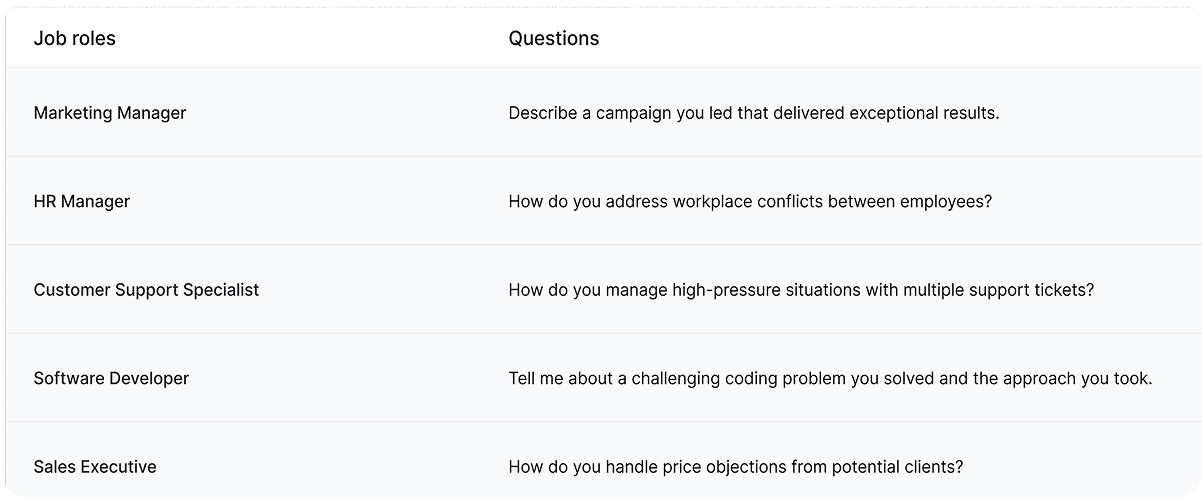


Top Interview Questions for Different Roles: A Recruiter’s Guide
Asking the right interview questions can make the difference between hiring someone who excels in the role and someone who struggles from day one. While generic questions like “Tell me about yourself” have their place, they rarely reveal the deeper insights you need to make a confident hiring decision. Role-specific interview questions help uncover a candidate’s true capabilities by targeting the skills, knowledge, and behaviours required for the position.
In this guide, you’ll find:
The importance of tailoring interview questions to each role
Key types of questions to include in your process
Examples for popular job categories
Tips on structuring interviews for consistent evaluation
Resources to help you plan and execute effective interviews
Whether you’re hiring for technical, creative, sales, or leadership positions, this guide will help you ask better questions and get better answers.
Why Role-Specific Questions Matter
Every job has unique demands. A software developer needs problem-solving skills and coding expertise, while a sales executive needs negotiation skills and client relationship management experience.
Benefits of role-specific interview questions:
- Assess Relevant Skills : Focus on what truly matters for job performance.
- Avoid Generic Answers : Reduce the risk of rehearsed responses
- Predict Job Success : Align questions with actual day-to-day responsibilities
- Enhance Candidate Experience : Show candidates you understand their role and industry.
When combined with a structured interview format, role-specific questions become even more powerful, as each candidate is measured against the same criteria. 🔗 Read next: How to Create a Structured Interview Process
Types of Interview Questions to Include
1. Behavioural Questions
Designed to understand how candidates have handled real situations in the past. Example: “Tell me about a time you had to manage a tight deadline. How did you handle it?”
2. Situational Questions
Hypothetical scenarios to gauge problem-solving and decision-making. Example: “What would you do if two team members disagreed on a project direction?”
3. Technical or Role-Specific Questions
Test specific skills required for the position. Example: “Explain your approach to debugging a complex software issue.”
4. Cultural Fit Questions
Assess alignment with company values and work style. Example: “What type of work environment helps you perform at your best?”
Sample Role-Specific Interview Questions
Below are example questions for popular job categories. These can be adapted to suit different industries or seniority levels.
Software Developer
Tell me about a challenging coding problem you solved and the approach you took.
How do you ensure the quality and security of your code?
What programming languages are you most comfortable with and why?
🔗 Tip: Use a Candidate Evaluation Scorecard to assess technical and soft skills side-by-side.
Sales Executive
How do you approach a cold lead to build trust and interest?
Describe a time you turned a “no” into a “yes.”
How do you handle price objections from potential clients?
Customer Support Specialist
- Tell me about a time you resolved a customer complaint successfully.
- How do you manage high-pressure situations with multiple support tickets?
- What steps do you take to ensure customer satisfaction after an issue is resolved?
HR Manager
- How do you address workplace conflicts between employees?
- What initiatives have you implemented to improve employee engagement?
- How do you measure the success of your HR programs?
Marketing Manager
- Describe a campaign you led that delivered exceptional results.
- How do you decide which marketing channels to prioritise?
- How do you measure ROI on marketing spend?

How to Use These Questions Effectively
1. Combine with a Structured Interview Process
Using the same questions for all candidates applying for the same role ensures fairness and makes comparisons easier.
2. Prepare Follow-Up Questions
Don’t stop at the candidate’s first answer - ask for specific examples or details.
3. Align Questions with Job Description
Ensure each question maps to a skill or competency outlined in the job posting.
4. Score Responses Consistently
A scoring system (1–5 scale, weighted criteria) keeps evaluations objective. 🔗 Download: Candidate Evaluation Scorecard
Avoiding Common Pitfalls
1. Asking Leading Questions
Avoid hinting at the desired answer.
- “You work well under pressure, right?”
- “Describe a time you worked under pressure. How did you handle it?”
2. Overloading with Hypotheticals
Balance situational questions with real-world behavioural ones.
3. Ignoring Cultural Fit
Skills matter, but so does team compatibility.
4. Failing to Adapt for Seniority
Entry-level candidates may need different questions from senior professionals
Building a Complete Interview Toolkit
While this guide provides a starting point, an effective interview process also requires:
- Clear role descriptions
- Pre-defined evaluation criteria
- A scoring system to ensure fairness
- Consistent documentation of candidate responses
Many modern recruitment platforms allow you to store question banks, share them with interviewers, and link answers directly to candidate profiles. This keeps hiring decisions transparent and collaborative, especially for teams handling multiple roles across different departments or clients.
Conclusion
Asking the right questions is one of the most impactful things you can do in an interview. By tailoring your approach to each role, using a mix of behavioural, situational, technical, and cultural fit questions, and applying a consistent evaluation framework, you can make more informed, confident hiring decisions.
📥 Next Step: Download our free Interview Question Bank Template to start building role-specific question sets for your next hiring round


